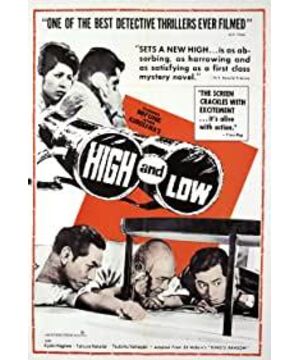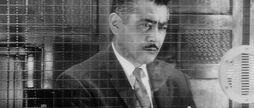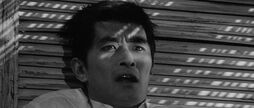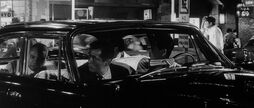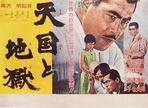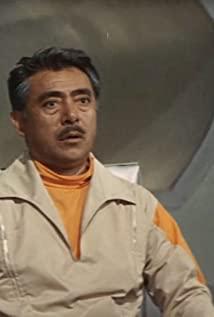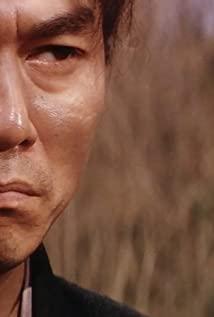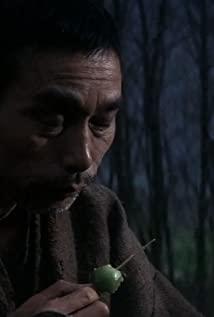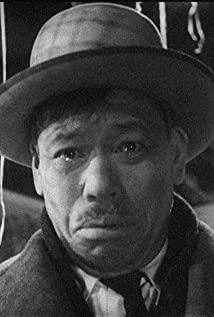The beginning was a meeting of several directors. Due to disagreements on issues such as company development and personnel issues, the two sides were at war with each other. Seeing this, the audience will think that this film is about the confrontation between "justice" and "evil", and then it must be a variety of tricks...Sure enough, the kidnapping case occurred in less than five minutes, and the enemy did not expect the enemy to act. So quickly, so the police quickly appeared on the scene. As the saying goes, the more people involved, the more complicated and beautiful the plot will be. Sure enough, in the increasingly complex plot, the first thing that surfaced was the collapse of the image of the "justice" of the three ships. After all, the kidnapped is someone else's son. Is it necessary to ruin the family? Under the contradiction between life and money, Sanchuan is just an ordinary person.
However, as the development progresses, it is found that the kidnapping case has nothing to do with company personnel, so the audience's thinking is misled by the previous plot, but the failure of expectations instead makes the audience generate new interest and attention, and follow the plot from the internal fight— -Kidnapping-paying the ransom-looking for clues-catching the criminals-the ending develops all the way, the rhythm is like a roller coaster, one link after the other is very smooth, plus the plot itself has a strong observability, so the film It looks particularly good-looking.
It’s one thing to look good, but after watching it, I found that some carefully constructed plots weren’t fully used, as if they really became landscapes on the road, and they were immediately left behind and became the foundation of the whole plot. It’s like the company’s personnel struggle in the beginning of the movie, but the result has nothing to do with the development of the whole story. There are also many doubts about the kidnapping case. I thought I would do some work in this area, but I still did it according to the kidnapper’s requirements. During the development of the story, Mifune has also changed from the protagonist to the passerby; another example is Nakadai’s investigation. After Nakadai became the protagonist, he thought he would focus on portraying, but the clues came so simple and easy to solve the case. In the end, the role of the three ships is added, which is to keep the structure intact and finish according to the theme.
Each of the three paragraphs mentioned above can be used on its own, and it can be made into a new work after careful sculpting. Such as the subject of personnel affairs, many court dramas can be filmed in the mainland; such as the theme of kidnapping, Hong Kong can also make thrilling gunman and gangster films; the subject of investigation, Japan can also be made into a thrilling and suspenseful detective film. You only need to arrange the right drama, and you will not worry about it. From this point of view, Akira Kurosawa concatenated three potential passages into a movie that lasts only over two hours without maximizing the value (dramatic) of the subject matter. It is truly a violent thing.
But thinking about it conversely, this is what makes Kurosawa Akira unique. Perhaps he has not considered the drama of the subject matter at all. Realism in chronological order is the real pursuit. In fact, although life is full of drama, life is not entirely composed of drama. Perhaps the audience will feel that the subject matter of the movie has not been fully developed, but life is really like this. A memory is always covered by a reality, inevitably moving forward like a train, and the rest will only leave some fragments of aftertaste. And "Heaven and Hell" is the reproduction of life-based shooting, and the development of the story has become real due to the lack of obvious drama, which has shortened the distance between the audience and the film.
Due to the strong position of Hollywood manufacturing, perhaps the audience has become accustomed to Hollywood's film format of "story assembly line production" and formed an inertial aesthetic based on genre film standards. They believe that the brilliance of a good story comes from drama. So our box office has contributed to a variety of dramatic and straightforward value output. Therefore, when facing another form of film, it will give the audience a new feeling. For example, after watching Fellini's "The Road", the feeling of disappointment makes people unable to follow; watching After Tarkovsky's "Stalker", that kind of thinking makes people confused and retreat; after watching Xu Anhua's "Day and Night in Tianshuiwei", the life-like fragments are endless...
Under normal circumstances, a movie that is too dramatic will cause a hormonal explosion and feel exciting. But for a long period of time, it is similar to frequent sex and love, but after the passion is restored, there is a variety of numbness. The memory of the movie in the mind is only a story frame, and the output values are only a few words and symbols. . We may remember every detail of "Alien" and we were very excited and stimulating when we watched it, but we cannot describe or remember what it felt like at the beginning; the audience may not remember the plot of a realistic film, but I can definitely remember the atmosphere and emotion that the movie seeps out, even if the feeling is faint and unpredictable.
Therefore, the emergence of realistic movies is like a person breathing fresh air from a dull environment. The plot arrangement of "Heaven and Hell" is life-oriented, but the drama has not been lost because of the movie's perspective, just like news reports, always following the development of core events. The marginalization of Mifune in the second half is the result of the role giving way to the film's narrative perspective. On the whole, the structure of the film is life-oriented, but the film language is dramatic, so there is no surprise in the development of the plot, but the specific passages create dramatic tension. For example, the handling of paying the ransom for a period of time has a lot of influence on later movies (in the recent "Chill", Aaron Kwok's handling of paying the ransom is also a bit similar); another example is the shooting in the market before the final capture of the criminal, which will be the same as before the storm. Tranquility is expressed vividly, especially the street shooting, which once again reflects the life of the film, and also prepares a writing point for Kurosawa Akira's reflection on the post-war society. As a result, the film has a proper lubrication process when it transforms from the story narration to the thematic preaching at the end of the film.
On the whole, "Heaven and Hell" still finds a balance between life and drama. Although the artificial traces are a bit obvious, it does not prevent Kurosawa's talents from being able to move freely in the art, at least for later They set a benchmark. The same situation reminds people of Spielberg’s Schindler’s List and Polanski’s The Pianist. Although the proportions of life and drama are different, effective balance may be a standard foothold.
View more about High and Low reviews


